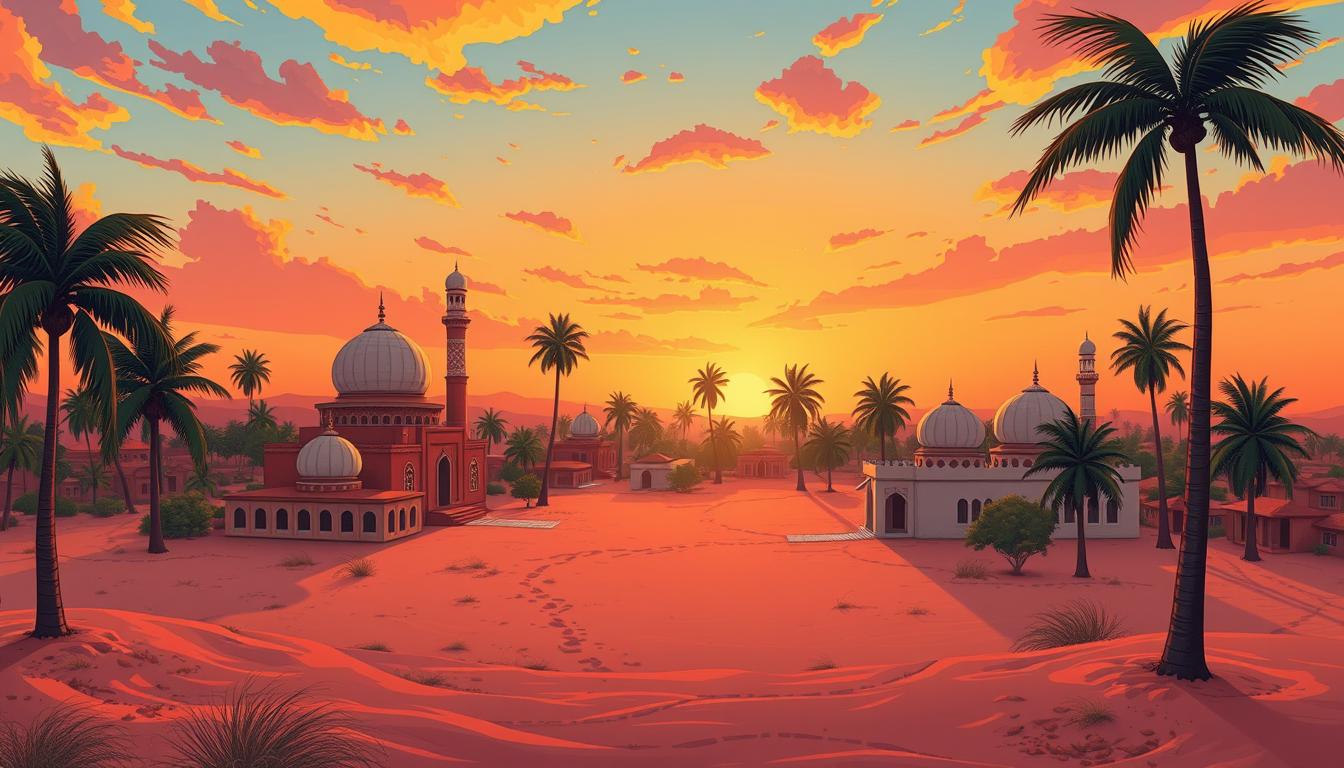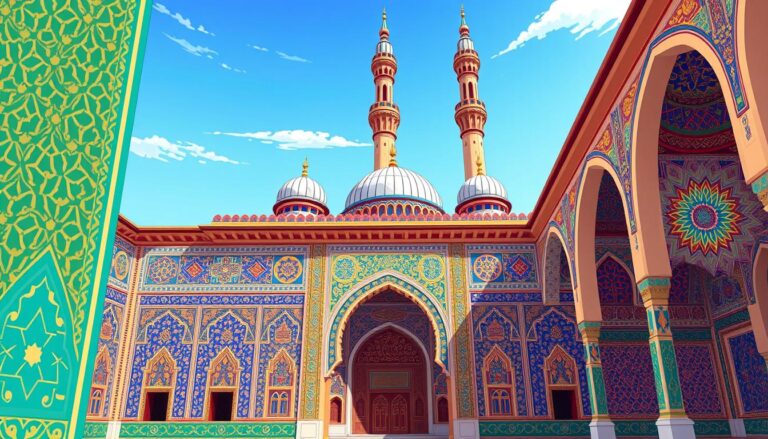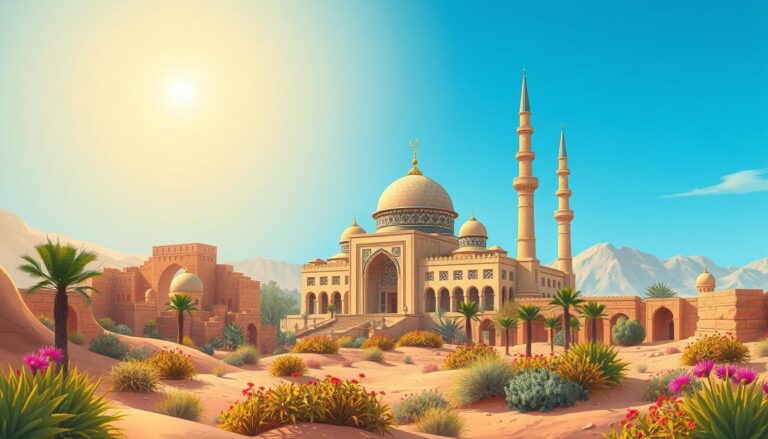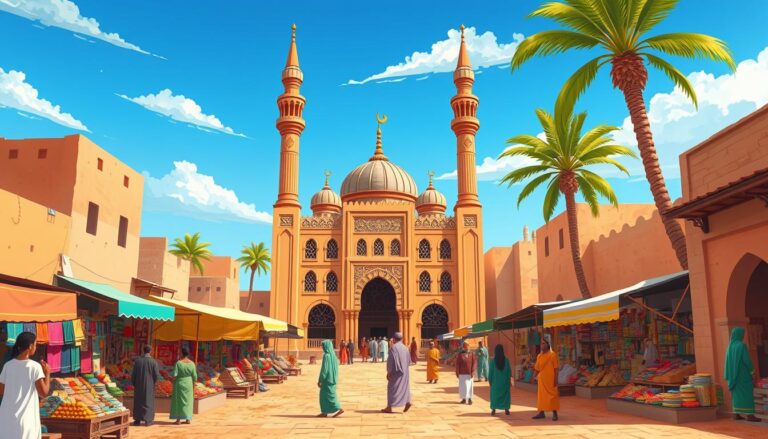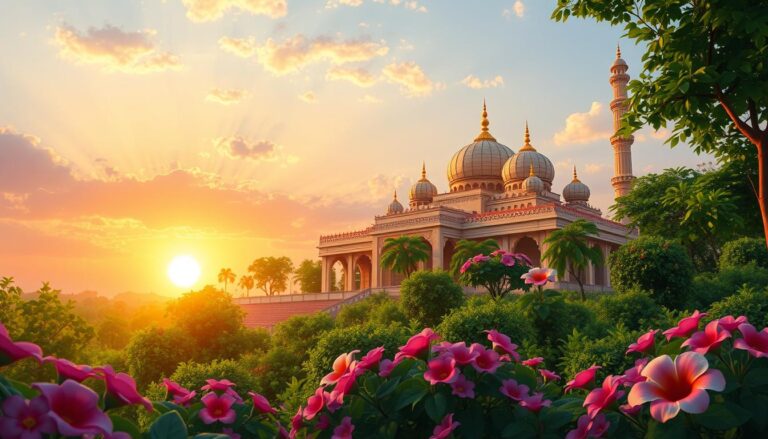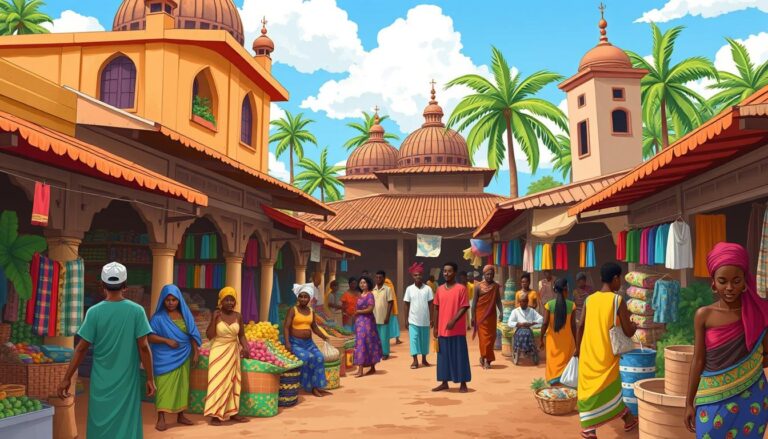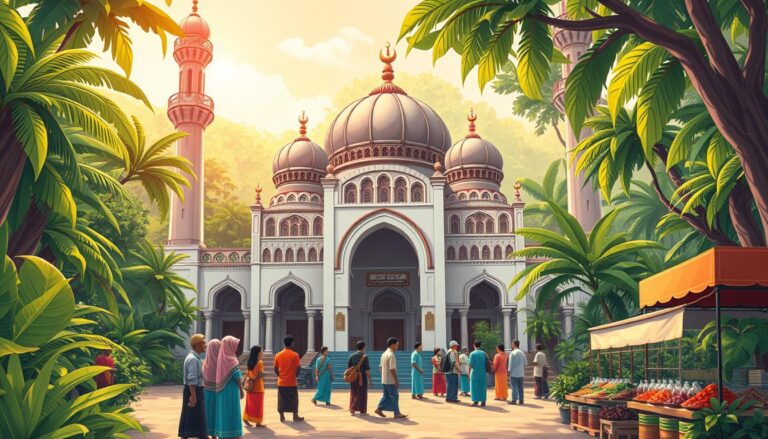Islam in Somalia
Islam has been a big part of Somali life since the 7th century. The first Muslims came to Somalia in Zeila, where they built the Masjid al-Qiblatayn. This is the oldest mosque in Somalia.
About 90% of Somalis follow Sunnism, the main branch of Islam. Shia and Ibadism are smaller groups.
Somalia’s Islamic roots are seen in its culture and politics. The Adal Sultanate and Ajuran Sultanate show Islam’s impact. Today, the Mosque of Islamic Solidarity in Mogadishu shows Islam’s lasting influence.
Introduction to Islam in Somalia
Islam has been a big part of Somali culture and society for centuries. It was first introduced to the northern Somali coast early on. This was after Prophet Muhammad’s migration from Mecca to Medina.
By the late 9th century, Al-Yaqubi, an Arab geographer, noted Muslims living along the northern Somali seaboard.
Historical Significance of Islam in Somalia
The role of Islam in Somalia’s history is huge. It has shaped the Somali people’s identity and values. This has made them different from their neighbors.
Most Somalis are Muslim, following the Sunni branch and the Shafi’i school of Islamic jurisprudence.
Prevalence of Islam in Somali Culture and Society
Islam is deeply rooted in Somali culture and society. Somalis are more religious than some other Muslim African populations. The idea of a “non-practicing Muslim” is rare in Somalia.
Moderate Islam, influenced by Sufism, is the main form of faith. However, the Salafi movement has grown in political influence lately. Behaviors not in line with Islamic principles, like blasphemy, are illegal in Somali law.
“Most Somalis practice a moderate form of Islam influenced by Sufism, with the Salafi movement gaining political influence in recent decades.”
Despite challenges from extremist groups like Al-Shabaab, Islam remains crucial in Somali lives. It shapes their culture, values, and social norms.
Early Spread of Islam in Somalia
The Adal Sultanate, with its capital in Zeila, started in the 9th or 10th century. It, along with the Sultanate of Mogadishu, was key in spreading Islam in Somalia. These sultanates were ruled by Somali dynasties and were hubs of trade with places like Arabia and China.
Islam became the main religion in these sultanates during the Middle Ages. They traded and exchanged cultures with the Muslim world. The Sultanate of Mogadishu thrived for over five centuries, shaping medieval Somalia’s culture.
“Islam has deep roots in Somalia, with the belief that the message of Islam spread peacefully before reaching Medina, Islam’s first capital city.”
Islam spread beyond major sultanates to smaller dynasties and chieftaincies. This gradual spread helped Islam become a big part of Somali history and identity.
Sufi Influence and Traditions
Sufi religious orders, or tariqas, have greatly shaped Somali Islam and the country’s history. The Qaadiriya, Ahmadiya, and Salihiyya are key Sufi orders in Somalia. They have deeply influenced both religious and cultural practices in the nation.
Prominent Sufi Orders in Somalia
The Qaadiriya is the oldest and most widespread Sufi tradition in Somalia. The Ahmadiya and Salihiyya, however, preach a more strict form of Sufi Islam. Despite their once dominant role, Sufis have faced challenges, with over a thousand graves desecrated by al-Shabab since 2006.
Yet, Sufis are slowly regaining ground as armed groups lose power to the government. Sufi leaders aim to attract young people by offering free education and opening more schools. Most Somalis today are nominal members of a Sufi order, with the brotherhoods running schools for kids.
“Sufism is the heart of Islam in Somalia, but it has faced significant challenges in recent years due to the rise of militant Islamism.”
The Ahmadiyya, Qaadiriya, and Salihiyya orders have joined forces to fight extremist ideologies. In 1991, they formed the Ahlu Sunna Wal Jamaa to protect their traditions and practices.
Sheikh Ali Maye Durogba introduced the Ahmadiyya order to Somalia. The Qaadiriya spread across North Africa, the Middle East, and beyond. The Salihiyya, a branch of the Ahmadiyya, was founded in Mecca and later became a militant anti-colonial movement under Muhammad Abdille Hassan.
Islam in Somalia During the Middle Ages
In the Middle Ages, the Adal Sultanate in Zeila built a strong army. Led by Imam Ahmad ibn Ibrahim al-Ghazi, they attacked the Abyssinian Empire in the 16th century. This event, known as the Islamic conquest of Abyssinia, greatly changed the area.
At the same time, the Ajuran Sultanate grew, with cities like Mogadishu becoming key medieval Islamic centers in Somalia. The Ajuran fought off the Oromo and Portuguese, keeping their power from the 13th to the late 17th centuries. They controlled water sources and built systems for farming and taxes that lasted until the 19th century.
“The Sultanate of Mogadishu thrived as a trading empire for six centuries from the 10th to the 16th century.”
The Adal Sultanate and the Ajuran Sultanate were major Islamic centers in Somalia during the Middle Ages. They played a big role in shaping the region’s history and culture.
Adal Sultanate and Conquest of Abyssinia
The Adal Sultanate, with Zeila as its capital, had a powerful army. Led by Imam Ahmad ibn Ibrahim al-Ghazi, they invaded the Abyssinian Empire in the 16th century. This campaign, known as the Islamic conquest of Abyssinia (Futuh al-Habash), had a big impact on the region.
Ajuran Sultanate and Islamic Centers
The Ajuran Sultanate also thrived during the Middle Ages. Its coastal cities, like Mogadishu, became important medieval Islamic centers in Somalia. The Ajuran fought off the Oromo and Portuguese, keeping their power from the 13th to the late 17th centuries. They controlled water sources and built systems for farming and taxes that lasted until the 19th century.
- The Sultanate of Mogadishu thrived as a trading empire for six centuries from the 10th to the 16th century.
- The Ajuran Sultanate successfully resisted invasions from the Oromo people and Portuguese forces during the 13th to late 17th centuries.
- The Ajuran Sultanate monopolized water resources, including the Shebelle and Jubba rivers, and developed agricultural and taxation systems that lasted until the 19th century.
Islam in Modern Somalia
The role of Islam in Somali society was greatly affected by colonialism and Western influence. As Somalia entered the modern era, religious leaders lost some of their power. This change happened mainly in the 1950s and 1960s, as the country dealt with independence and the post-colonial world.
After the 1969 revolution, Siad Barre’s socialist government tried to link its policies with the Quran. At the same time, it warned religious leaders to stay out of politics. This balance between secular rule and Islam’s role in society shaped Somalia’s future.
Westernization and Islam in Somalia
The arrival of Western systems and ideas changed how Islam was seen and practiced in Somalia. The 1961 constitution of Somalia declared the country an Islamic state, guaranteeing freedom of religion. But, Western values and institutions kept changing, affecting the relationship between Islam and the state.
After the Transitional Federal Government (TFG) was set up and Ethiopian troops got involved, there was confusion about faith and politics. The Ulema Council, started in 2009 with Sheikh Sharif leading, tried to guide the Somali people through this hard time.
“The Ulema issued directives demanding the withdrawal of AU peacekeeping troops within four months and the adoption of Shari’a by Parliament.”
The Ulema’s efforts to bridge the gap between the TFG and opposition groups showed the complex mix of Islamic values, politics, and outside influences on Somalia’s religious scene.
Islamic Revival Movements
In Somalia, Islamic revival movements have been a big deal. They aim to bring back traditional Muslim ways and fight off Western and modern influences. Leaders like Mohammed Abdullah Hassan have fought against Western education. Others, inspired by Islamic socialism from Gamal Abdel Nasser, try to make Islam fit with social change and progress.
The Islamic revival in Somalia has gone through four main stages. These stages are: the Islamic revival (1800-1950), the rise of Islamic awareness (1950-1967), the start of Islamic awakening (1967-1978), and the rise of Islamic movements (1978-). Scholars have studied this a lot, especially after Somalia’s state fell in 1991 and Islamic groups became more active.
The Islah Movement is a key Islamic group in Somalia, starting on July 11, 1978. It holds elections every five years. The fourth chairman was elected on August 12, 2008. The Islah Movement is different from the Union of Islamic Courts and has its own plans and beliefs.
The Islamic revival movements in Somalia have been influenced by the Muslim Brotherhood and Wahhabism. These groups have greatly influenced Somali politics and conflicts. They aim to change the country’s social and political scene based on their Islamic views.
“The Islamic revival movements in Somalia have been a driving force, reflecting a desire to revive orthodox Muslim traditions and counter the perceived impacts of Westernization and modernization.”
The Islamic revival movements in Somalia keep changing. The mix of old Islamic values, new views, and Somalia’s complex politics is still a big topic for scholars and the public.
Islam in Somalia During the Post-Colonial Era
After gaining independence in 1960, Somalia declared itself an Islamic state. But, the first two governments didn’t make many changes. It wasn’t until the 1969 coup under Siad Barre that Islam became more involved. The government said its policies matched Quranic principles.
Role of Islam in Somali Politics and Conflicts
In the post-colonial era, Islamic groups were key in Somali politics and conflicts. The Islamic Courts Union (ICU) was respected for bringing order before being ousted by a 2006 invasion. Some ICU members then joined the radical Al-Shabaab, aiming for a regional theocracy.
Not all Somali Islamists are extreme. Many focus on community work and development. The election of Islamist Hassan Sheikh Mohamud in 2012 marked a shift towards democracy. It emphasized human rights and freedom of religion.
The influence of Islam in Somali politics is complex. Both moderate and extremist groups seek power. Understanding this is key to supporting human rights and stability.
“Somali activists have found that emphasizing equality for women through Sharia is more effective than focusing on legal rights under international law.”
Islam and Peacebuilding Efforts
In Somalia, Islamic scholars and religious leaders are key in making peace. The Ulema, respected Islamic scholars, help find solutions by using Islamic teachings. They guide negotiators to reach agreements and calm tensions.
The Ahlu Sunna Wal Jama’a, a group of Somali Sufi religious leaders, is a big player in peace efforts. They use their spiritual power to settle disputes and bring Somali clans together.
“The traditional Somali approach to peacemaking is considered viable and effective.”
The work of Islamic scholars in conflict resolution and the Ulema in Somali reconciliation is seen as very important. They use the Somali people’s shared faith and culture to unite them. This helps in making the region more stable.
As Somalia faces ongoing conflicts, the role of Islamic scholars and groups is vital. They are key to finding lasting peace and stability in the country.
Contemporary Issues and Challenges
After 2006, Islamic scholars in Somalia, known as Ulema, saw changes. Wahhabi and Salafist ideas started to challenge the old Sufi orders. The Ulema Council, started in 2009, tried to lead with moral guidance. But, it faced opposition from some groups.
Important Islamic scholars, like Sheikh Omar Faruq, spoke out against using violence in the name of Islam. Yet, contemporary challenges in Somali Islam, like the fight between Wahhabism and Sufism, still affect the religious scene.
Role of Islamic Organizations
Islamic groups in Somalia are key in the country’s politics and society. They deal with tough issues like Wahhabism vs Sufism. They also play a big part in showing the role of Islamic organizations in Somalia.
But, some worry about these groups’ influence. They fear some might support political sides or push for division. Finding a balance between Islamic groups’ role and inclusive religious leadership is a big challenge in Somalia.
“The role of Islamic scholars and organizations in Somalia is critical, as they navigate the complex landscape of religious and political dynamics in the country. Their ability to promote unity, justice, and ethical leadership will be essential in addressing the contemporary challenges in Somali Islam.”
Conclusion
Islam has been a big part of Somali society since the 7th century. It has shaped the country’s history, culture, and politics. From the early days of Islam to the role of Sufi orders and Islamic scholars, Islam has been key.
Despite challenges, Islam remains a core part of Somali identity. It continues to influence the nation’s path. The Somali people have embraced Islam for centuries, with its presence even before Madina Al-Munawarah.
Over seven centuries, Islam helped establish towns, markets, and centers of learning. By the 15th century, most Somalis were Sunni Muslims. Today, nearly all Somalis follow the faith.
Sufi orders, like the Qadiriyya, and Islamic scholars have played big roles in Somalia’s history. But extremist groups like Al-Shabaab have hurt Sufism and caused religious intolerance. This has made it hard for Somalia to move forward.
As Somalia looks to the future, understanding Islam’s role is crucial. It shapes the nation’s identity, politics, and how it deals with conflicts.
Source Links
- Islam in Somalia
- Islam and Somali social order
- Religion in Somalia
- Somali – Religion
- Islam and Somali social order
- The Origins of Islam in East Africa
- The Sultanates of Somalia
- Somali Islamists: A potential ally?
- Somalia’s Sufi revival
- Sufism in Somalia
- The Sultanates of Somalia | World Civilization
- Somalia – United States Department of State
- Somalia – United States Department of State
- SSJ Book-whole articles
- ISLAH MOVEMENT IN SOMALIA revised Edited[1] – Edited
- Somalia’s fight for God-given rights
- Men of the Spear and Men of God: Islamism’s Contributions to the New Somali State
- Understanding Political Islam in Somalia
- African Conflict & Peacebuilding Review
- The Role of the Traditional Somali Model in Peacemaking
- Afyare Abdi Elmi. Understanding the Somalia Conflagration: Identity…
- Somalia country profile
- Somalia – United States Department of State
- Somalia – United States Department of State
- The Role of Islam in Peace and Development in Somalia (Continuity and Change)
- Christian Heritage and the Rise of Islam in Somalia

